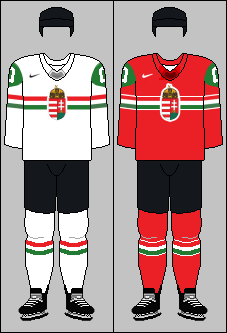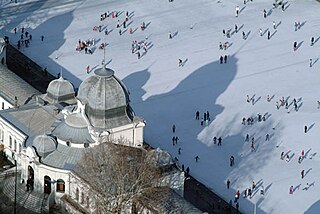
Dunaújváros is an industrial city in Fejér County, Central Hungary. It is a city with county rights. Situated 70 kilometres south of Budapest on the Danube, the city is best known for its steelworks, which is the largest in the country. It was built in the 1950s on the site of the former village of Dunapentele and was originally given the name of Sztálinváros before acquiring its current name in 1961.

Hungary competed at the 1980 Summer Olympics in Moscow, USSR. 263 competitors, 182 men and 81 women, took part in 151 events in 21 sports.

Magyar Testgyakorlók Köre is a multi-sports club from Budapest, founded in 1888. It has sections for football, handball, basketball, volleyball, futsal, ice hockey, water polo, cycling, gymnastics, athletics, fencing, canoeing, boxing, wrestling, swimming, rowing, karate, taekwondo, sailing, speed skating, skiing, table tennis, tennis and chess.
Újpesti Torna Egylet is a Hungarian sports society, based in Újpest, Budapest. The club, which was founded in 1885, includes sports sections that represent the club at ice hockey, men's water polo, women's volleyball, athletics, wrestling, judo, mud wrestling, flatwater canoeing/kayaking, karate, youth football, boxing, modern pentathlon, shooting, gymnastics, triathlon, swimming, and fencing. There is a leisure section and a section for the club's fans called 'circle of friends'.
The following are the football (soccer) events of the year 1935 throughout the world.

The Hungarian men's national ice hockey team is the national ice hockey team of Hungary. They have participated in the IIHF European Championships, the IIHF World Hockey Championships and the Olympic Games since 1928. A consistent participant of the annual World Championship, Hungary has played at the Olympics three times, most recently in 1964. They are currently ranked 19th in the world by the IIHF.
Németh is a Hungarian surname. In Hungarian, német means "German" ; the h is a remnant of obsolete Hungarian spelling, as frequently found in names, especially in families of noble origin. Alternate spellings include "Nemeth", "Neimeth", "Német", "Nemath", "Namath", "Nameth", "Nemet" and "Nimitz". The name is also common in Austria and Germany. It is an uncommon given name. People with the name or its variants include:

Hungary competed at the 1960 Summer Olympics in Rome, Italy. 184 competitors, 157 men and 27 women, took part in 107 events in 18 sports.

Hungary competed at the 1964 Winter Olympics in Innsbruck, Austria.

István Orosz is a Hungarian painter, printmaker, graphic designer and animated film director. He is known for his mathematically inspired works, impossible objects, optical illusions, double-meaning images and anamorphoses. The geometric art of István Orosz, with forced perspectives and optical illusions, has been compared to works by M. C. Escher.
Antal is clan (gotra) of Jats found mainly in Punjab besides it is also a surname of Hungarian origin.
Orosz is a Hungarian language surname, which means "Russian", derived from the Turkish urus, which in turn derived from the Russian Rusak ("Russian"). Rusak originates from a Scandinavian term for "oarsman" or "rower", referring to early Russians who rowed their ships inland from the Baltic sea. The name may refer to:

The City Park Ice Rink is a public ice rink located in the City Park of the Hungarian capital Budapest, between the Heroes' Square and the Vajdahunyad Castle. Opened in 1870, it is the largest and one of the oldest ice rinks in Europe. In summer months the area is filled up with water to create a pond, which is primarily used for boating, but also hosted several special events, such as the snowball fight world record attempt in 2009 or the Art on Lake exhibition in 2011.
141 Minutes from the Unfinished Sentence is a 1975 Hungarian drama film directed by Zoltán Fábri. It was entered into the 9th Moscow International Film Festival where Fábri won a Special Prize for Directing.
Pal Orosz was a Hungarian footballwe. He played for Hungarian National Olympic Football Team during the 1960 Summer Olympics in Rome, where they won the bronze medal.
Edit Mató was a Hungarian ice dancer. With Károly Csanádi, she was the 1966 Winter Universiade champion and a four-time Hungarian national champion. The duo competed at three World Championships and five European Championships. They placed within the European top ten in 1966, 1967, and 1968.
Károly Csanádi is a Hungarian former ice dancer. With Edit Mató, he is the 1966 Winter Universiade champion and a four-time Hungarian national champion. The duo competed at three World Championships and five European Championships. They placed within the European top ten in 1966, 1967, and 1968.
Ilona Berecz is a Hungarian ice dancing coach and former competitor. With István Sugár, she is a two-time Hungarian national champion and the 1968 Blue Swords bronze medalist. They finished in the top ten at three European Championships.
Bakos and in Slovak the accented Bakoš are surnames.





